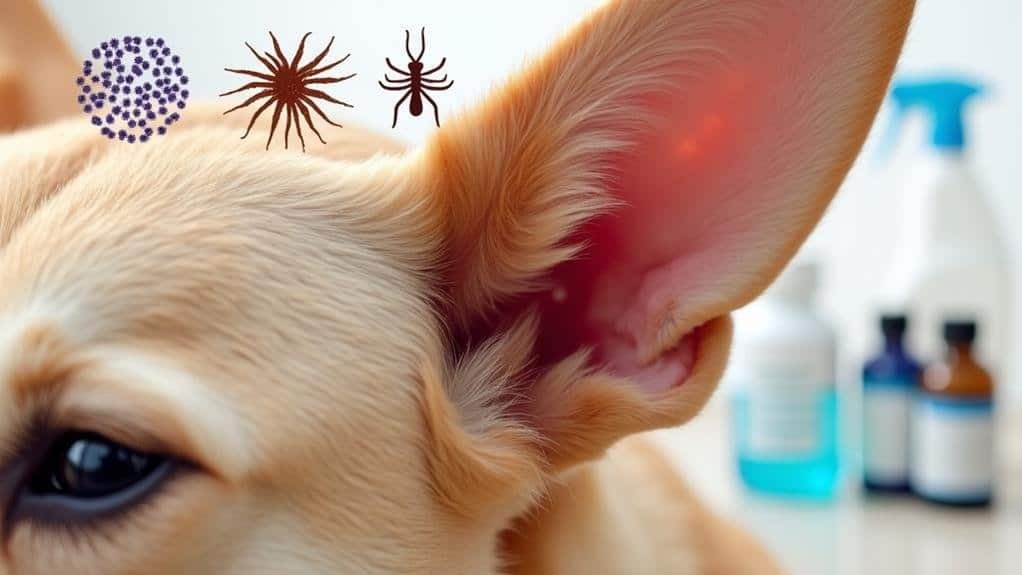Your dog’s stinky ears can stem from several factors, including their unique ear anatomy and potential health issues.
The L-shaped ear canal can trap moisture and debris, leading to wax buildup and odor.
Floppy-eared breeds are especially prone to ear problems. Common causes include yeast or bacterial infections, ear mites, and excessive wax accumulation.
Regular cleaning with vet-approved solutions can help prevent odors and infections.
Watch for signs like redness, discharge, or frequent scratching, as these may indicate a more serious problem.
If the smell persists or is accompanied by other symptoms, it’s best to consult your veterinarian.
Understanding the root causes can help you keep your pup’s ears healthy and odor-free.
Ear Anatomy and Odor Causes
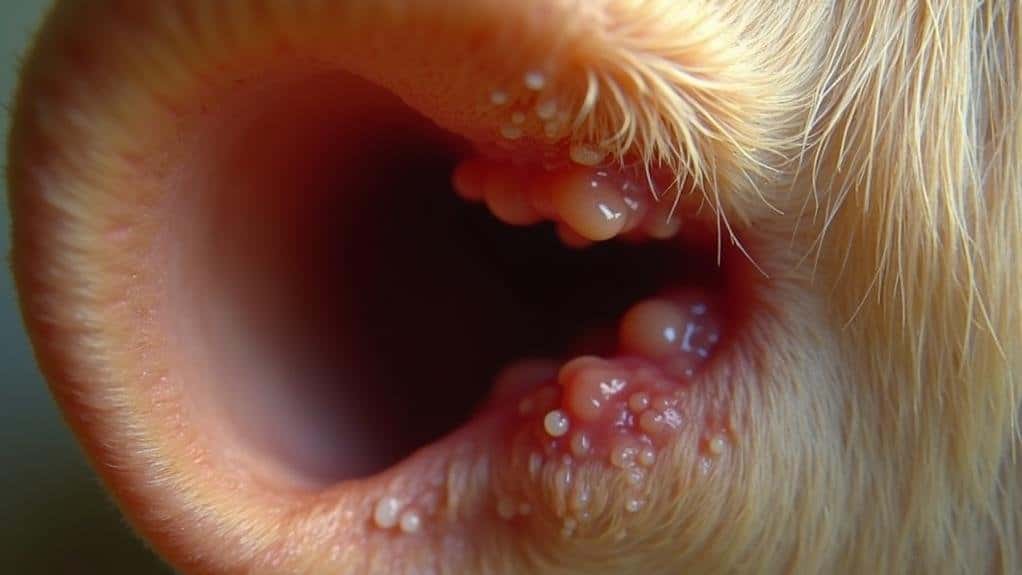
Three key factors contribute to dog ear odors: anatomy, breed, and underlying health issues. Your dog’s ear anatomy plays an important role in odor development. The J or L-shaped ear canals can trap moisture, debris, and wax, creating an ideal environment for bacteria and yeast to thrive.
This unique structure makes cleaning your dog’s ears challenging and increases the risk of ear infections.
Floppy-eared breeds are particularly susceptible to ear problems due to poor airflow, which promotes bacterial and yeast growth. As a result, these dogs often require more frequent ear care to maintain their health.
Ear wax buildup is a common cause of mild odors. While some wax is normal, excessive accumulation may indicate a need for cleaning.
Yeast infections, often caused by Candida overgrowth, produce a distinct musty or sweet smell and can lead to redness and discharge.
Ear mites are another potential culprit, causing a foul smell and dark, crumbly discharge. If you notice your dog excessively scratching their ears or detect an unpleasant odor, it’s vital to investigate the cause and seek appropriate treatment to guarantee your dog’s overall health.
Identifying Ear Infections
When your dog develops an ear infection, prompt identification is vital for effective treatment. You’ll want to be on the lookout for common symptoms like redness, swelling, and ear discharge. The discharge may be brown, yellow, or black, depending on the type of infection.
If you notice your dog shaking its head frequently or scratching at its ears, these could be signs of discomfort associated with an infection. A foul odor emanating from your dog’s ears is another telltale sign. Different types of infections, such as yeast or bacterial infections, can produce distinct smells.
However, it’s important to have a veterinarian examine your dog’s ears for an accurate diagnosis. They may perform cytology tests to identify the presence of yeast or bacteria, which will guide the appropriate treatment plan.
Regular ear checks and cleaning your dog’s ears can help prevent infections, especially in breeds prone to ear problems. By staying vigilant and addressing any issues early, you can keep your dog’s ears healthy and odor-free.
Ear Wax Buildup Issues
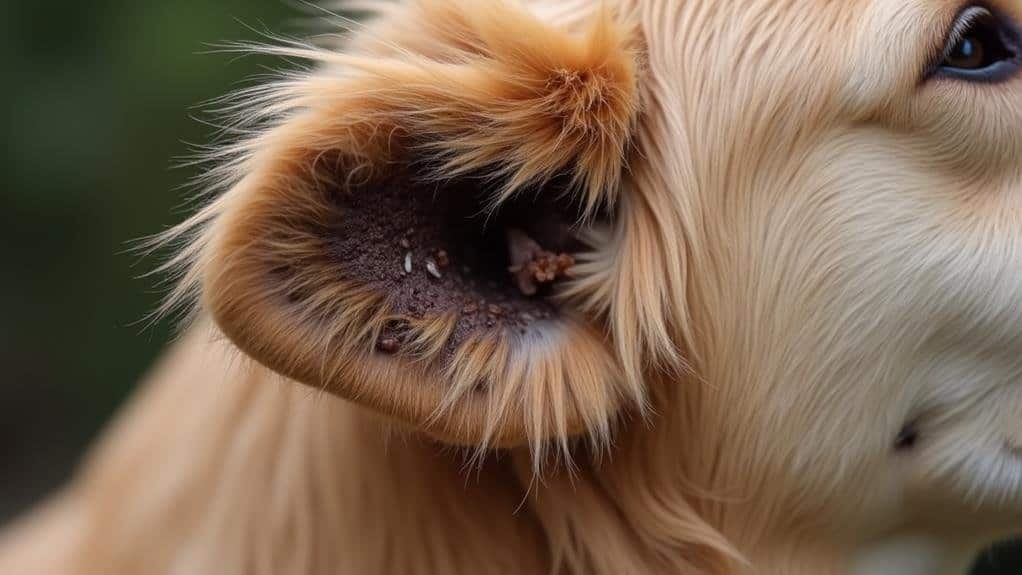
While ear wax serves as a natural protective mechanism for your dog’s ears, excessive buildup can lead to problems. One of the most common causes of stinky ears in dogs is ear wax buildup, which can create a mild odor. This is often a sign that it’s time for cleaning to maintain your pet’s ear health.
You might notice yellow ear wax, a telltale sign of buildup that your dog may not react to until it becomes uncomfortable. Regular checks are essential to prevent severe accumulation and avoid unpleasant odors. Some dog breeds, like Golden Retrievers, are more prone to excessive ear wax production and may need more frequent attention.
When dealing with ear wax issues, it’s important to use veterinarian-approved cleaning solutions. Don’t attempt to clean your dog’s ears without proper guidance, as improper techniques or home remedies can irritate the ear further.
Only clean when advised by a professional to guarantee you’re not causing more harm than good. By staying vigilant and following your vet’s recommendations, you can help keep your dog’s ears healthy and odor-free.
Cleaning Your Dog’s Ears
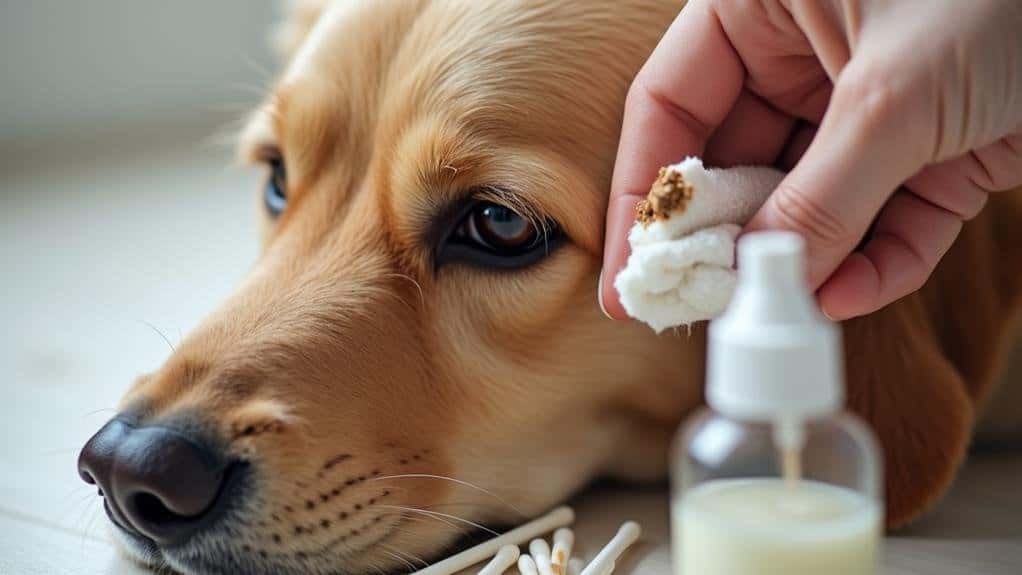
Keeping your dog’s ears clean is an essential part of their overall health and hygiene routine. Regular ear cleaning helps prevent wax buildup and associated odors, especially in breeds prone to ear issues.
To keep your dog’s ears healthy, use only vet-approved ear cleaning solutions that safely remove debris without causing irritation.
When cleaning your dog’s ears at home, apply the solution into the ear canal and gently massage the base to dislodge debris. Follow up by wiping with a cotton ball or soft cloth.
Avoid using cotton swabs deep inside the ear canal, as this can push debris further in and potentially cause injury.
The frequency of ear cleaning should be tailored to your dog’s needs. Check them at least once a week for signs of infection or wax buildup.
Common causes of smelly ears include excessive wax, infections, or allergies. If you notice persistent odors or discomfort, consult your veterinarian for proper diagnosis and treatment.
Preventing Ear Odors
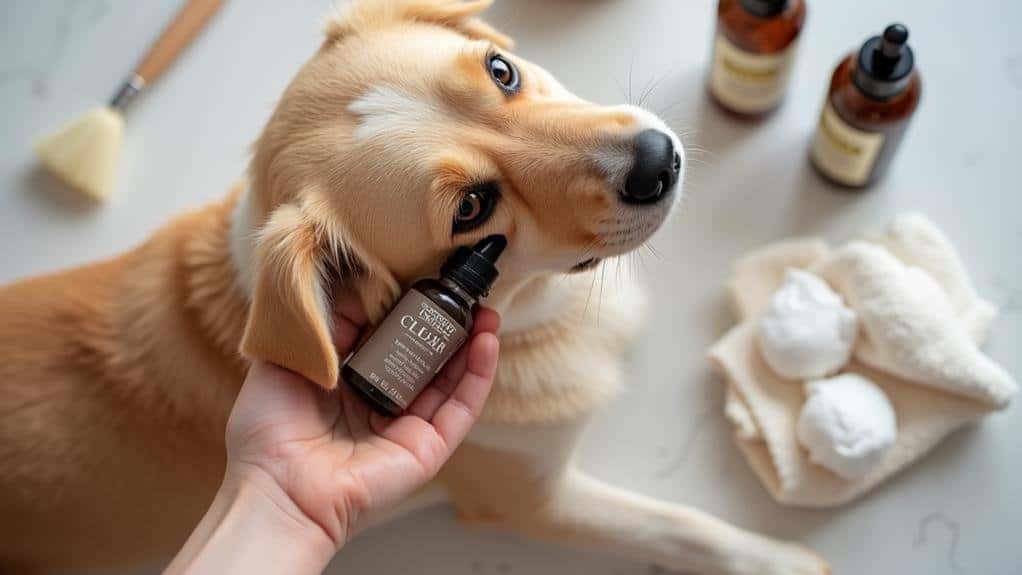
A crucial aspect of preventing ear odors in dogs is maintaining a proactive approach to ear health. Start by conducting weekly ear checks to spot any early signs of issues like discharge or swelling.
Implement a regular cleaning routine using veterinarian-approved solutions to prevent ear wax buildup and associated odors, especially for breeds prone to ear problems.
Keep a close eye on your dog’s behavior, noting any changes such as excessive scratching or head shaking, which can indicate ear issues that may lead to odor if left untreated.
After swimming or bathing, make sure your dog’s ears are completely dry to prevent bacterial or yeast infections that can cause foul smells.
Consult your veterinarian for advice on preventive measures and proper ear cleaning techniques tailored to your dog’s specific needs.
They can guide you on the best products and methods to use, helping you maintain healthy, odor-free ears.
When to Consult a Veterinarian

Vigilance is key when it comes to your dog’s ear health. While some ear odors may be temporary, certain signs indicate it’s time to consult a veterinarian. If you notice a foul odor coming from your dog’s ears, don’t ignore it. This can be a sign of ear infections that require professional treatment.
Be on the lookout for these warning signs that warrant a veterinary consultation:
- Persistent symptoms like redness, swelling, or discharge
- Your dog showing signs of pain, such as excessive scratching or head shaking
- Recurrent ear infections, which may signal underlying allergies or health issues
- Behavioral changes like irritability or depression alongside ear odor
- Uncertainty about proper ear cleaning techniques, especially if your dog has a history of ear problems
Frequently Asked Questions
How Do You Treat a Dog’s Smelly Ears?
To treat your dog’s smelly ears, first visit a vet for proper diagnosis. They’ll recommend appropriate medications or cleaning solutions. Don’t use home remedies. Clean regularly with vet-approved products, and follow up to ascertain effective treatment and prevent recurrence.
What to Use to Clean Dogs’ Ears With Home Remedies?
You shouldn’t use home remedies to clean your dog’s ears. Instead, opt for vet-approved ear cleaning solutions. They’re safe and effective. If you’re concerned about ear odor or buildup, consult your vet for proper cleaning techniques and products.
How to Cure Smelly Ears?
To cure your dog’s smelly ears, you’ll need to consult a vet for proper diagnosis. They’ll likely prescribe specific medications. Meanwhile, clean the ears regularly with vet-approved solutions. Don’t use home remedies, as they can cause irritation.
How to Treat Dog Ear Yeast Infection Without a Vet?
You can treat your dog’s ear yeast infection by using over-the-counter antifungal treatments like clotrimazole. Clean the ears regularly, keep them dry, and add probiotics to your dog’s diet. Monitor symptoms closely and seek veterinary care if they worsen.
Conclusion
You’ve learned about the common causes of stinky dog ears and how to address them.
Remember, regular cleaning and checks are key to preventing odors and infections.
Don’t ignore persistent smells or discomfort, as they could signal serious issues.
If you’re unsure or the problem persists, it’s always best to consult your vet.
With proper care, you’ll keep your pup’s ears healthy and odor-free, ensuring their comfort and well-being.

